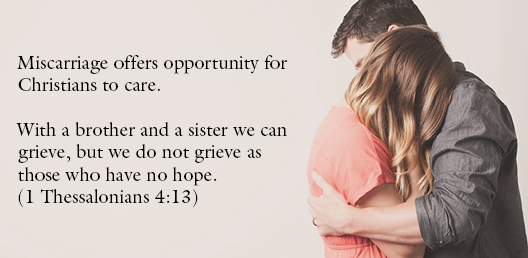
Many, many couples and families endure the grief of pregnancy loss. Studies indicate that 10 to 20 percent of known pregnancies end in miscarriage. Most occur before the 12th week. More than half of miscarriages happen without the mother even knowing it, and some research suggests that miscarriages may outnumber live births.
President Ronald Reagan designated October 1988 as Pregnancy and Infant Loss Awareness Month. The U.S. House of Representatives recognized October 15, 2006, as the very first National Pregnancy and Infant Loss Remembrance Day. As of 2016, all 50 American states have yearly proclamations of it.
Popular culture defines procreative experiences as private choices. Even in congregations, those who go through miscarriage often suffer in silence and solitude. The Gospel of Jesus Christ insists that since He died and rose for all, “[i]f one member suffers, all suffer together” (1 Corinthians 12:26a).
Here are just ten ways you get to go with those who suffer through the shadowed valley of death before birth.
-
Let go of trying to make them feel better. You don’t have to be their Savior. They already have the best One. Their questions, defenses, screams, and tears are a holy response to an awful event. They don’t need answers or diagnoses; they want their baby back.
-
Notice them. Perk up ears and keep eyes peeled for neighbors who may be carrying this cross. Take the time to stop and talk. God has positioned and prepared you—you!—with His Word for this relationship and vocation. Acknowledge this life-changing heartbreak has happened. It’s always appropriate to say, “I’m so sorry for your loss.”
-
Ask about their experience. Would you like to tell me about it? What happened? Where and when did you find out? How many weeks’ gestation? What arrangements were you making? How were you envisioning your little one? How has it been affecting you?
-
Listen even if it gets uncomfortable. Allocate time and space specifically and exclusively to these interactions. Minimize distractions and interruptions. Express attention and interest with your body language. Summarize what you hear them saying. Laugh, gasp, growl, sigh, and cry with them. Make it okay for them to repeat themselves or say nothing at all. Stay patiently engaged and promise confidentiality.
-
Assure them Jesus knows and undergoes it with them. “Jesus wept” (John 11:35). “Surely He has borne our griefs and carried our sorrows” (Isaiah 53:4a). He identifies most closely with aching ones (“[b]lessed are those who mourn,” Matthew 5:4a; “the least of these my brothers,” Matthew 25:40b). The Incarnate and Crucified One leaves nobody to hurt alone.
-
Affirm that it also saddens and angers God. The Almighty Maker never intended or planned death. He sacrificed Himself to do something serious about it. He has felt the emptiness of absent offspring: “How often would I have gathered your children together as a hen gathers her brood under her wings, and you would not” (Matthew 23:37b). He became enraged when His children were kept from him (Mark 10:14).
-
Remind them God is not punishing. While death comes about as the wages of sin, not every death directly results from a particular sin. Jesus has already received and resolved all punishment for sin: “upon him was the chastisement that brought us peace” (Isaiah 53:5b). Our Lord has no condemnation (Romans 8:1) but only delight for His forgiven ones: “You are my beloved … with you I am well pleased” (Luke 3:22b).
-
Rest together in resurrection. The promise of the Last Day will relieve all sorrow. The hope of everlasting life will heal every loss. God’s presence will undo this, as it has already begun to do in raising Christ Jesus. They will see their departed child again: “I shall go to him, but he will not return to me” (2 Samuel 12:23b). Assist them in envisioning the reunion and the restoration.
-
Thank them for sharing sacred space. Grief erupts from a spiritual place. Inviting another soul into such intimate retreats takes guts and trust. It connects individuals at profound levels. They have given part of themselves as a gift. You’ve received the privilege of a firsthand encounter with the workings of the Heavenly Father. Your expressions of gratitude will reinforce it.
-
Reach out to Dad too. Every miscarriage also involves a father. They may feel even more hesitant than the mothers to have company in their cross-bearing. Yet they long for the same balm of fellowship. His child died, too, and he never connected physically like the mother. Step in to shield him from the common perception that pregnancy loss is a “personal problem” or a “women’s issue.”